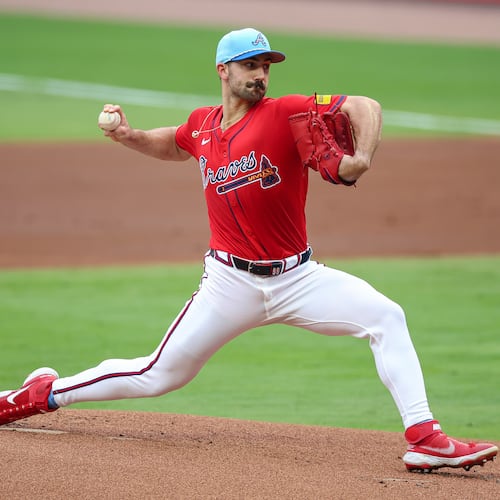The Braves signed Freddie Freeman to record-breaking $135 million contract and also signed Jason Heyward, avoiding arbitration with two of the young stars they’d been set to face in hearings beginning next week.
However, the team still is scheduled for an arbitration hearing with Craig Kimbrel on Feb. 17, barring an unlikely multi-year deal being worked out with the All-Star closer before then.
Heyward got a two-year, $13.3 million deal, and Freeman broke the bank with an eight-year deal worth $45 million more than the previous franchise record of $90 million for Chipper Jones’ six-year extension prior to the 2001 season. Both Freeman and Heyward are represented by Excel Sports Management.
Heyward’s deal includes performance-based escalators that could increase his salary in the second season of the deal in 2015. The contract was agreed to Sunday night and finalized after Heyward passed a physical exam Monday.
“I’m just excited that I don’t have to worry about the (arbitration) process any longer,” said Heyward, who will be eligible for free agency after the contract expires following the 2015 season. “I didn’t know if it was going to get done or not. You just hope to agree to something. The business part, it can be a distraction. I’m glad it’s not.”
Braves general manager Frank Wren said signing Heyward and Freeman was not a sign of the team relenting in its “file and trial” strategy that eschews negotiations with players after the deadline when teams and unsigned arbitration-eligible players exchange salary-arbitration figures. That date was Jan. 17.
“It’s a very strict policy,” Wren said. “We have no exceptions, unless talks are about a multi-year contract. That’s always been the policy.”
The $300,000 difference between the one-year salaries proposed by Heyward ($5.5 million) and the Braves ($5.2 million) on Jan. 17 was the second-smallest among the 38 players who swapped figures with teams. Heyward’s new deal includes salaries of $4.5 million in 2014 and $7.8 million in 2015. He also got a $1 million signing bonus.
“Baseball has a business side to it when it comes to dollars and cents,” Heyward said after Tuesday’s announcement. “That’s not why I play. It’s not what I want to discuss when I’m trying to prepare for a season.”
The Braves had a tough time coming up with a specific salary figure to offer Heyward on Jan. 17 because he was coming off a season in which he showed flashes of his tremendous talent and versatility, but also missed more than two months due to surgeries for an appendectomy and a broken jaw.
Heyward, who burst onto the scene with an All-Star season as a rookie in 2010, played in 104 games in 2013 and made $3.65 million while hitting .254 with 37 extra-base hits (14 homers) in 440 at-bats. That included.322 with a .403 on-base percentage and six homers in 118 at-bats from the leadoff spot.
The 6-foot-5, 240-pound McDonough native gave the Braves’ offense a much-needed spark at the leadoff spot before being struck in the jaw by a fastball from Mets left-hander Jonathan Niese on Aug. 21. He returned a month later.
“Jason is an important part of our organization and we’re glad that we were able to agree on a multi-year contract,” said Wren, who added that there were never any offers made for a deal of three years or more that would buy out potential free-agent years for Heyward.
Braves pitchers and catchers report to spring training Feb. 12 at Lake Buena Vista, Fla., with their first workout scheduled the next day. Remaining position players are due in by Feb. 18, and the first full-squad workout is Feb. 19.
Hearings for arbitration-eligible players who remain unsigned are scheduled through Feb. 21 in St. Petersburg, Fla. The Braves, after not going to a hearing with any player since John Rocker in 2001, are prepared to go all the way with Kimbrel.
A three-member arbitration panel would determine which salary each player gets, and it must be either the salary proposed by the player or by the team when the sides swapped arbitration salaries on Jan. 17. The panel cannot “split the difference” between proposed salaries – it must select one of the two salaries exchanged in each case.
Kimbrel, baseball’s most dominant closer in his first three full seasons, asked for a $9 million salary, which is $3.75 million above the previous record for a reliever in his first year of arbitration. The Braves offered $6.55 million, still above the record but about $500,000 below what Kimbrel had been projected to get by a couple of experts who’ve studied baseball arbitration extensively.
The difference in salaries proposed for Kimbrel was among the highest of the 38 players to exchange figures with teams on Jan. 17. Freeman had asked for $5.75 million, also significantly above the $4.5 million proposed by the team.
In the case of Kimbrel, the panel’s decision could go a long way in determining whether the Braves, with their modest payroll, can afford to keep the game’s best closer for more than one more season. Because if he gets $9 million for 2014, Kimbrel could realistically expect to get at least $14 million a year from now if he hasn’t signed a long-term extension and goes through the arbitration process again.
About the Author
Keep Reading
The Latest
Featured


